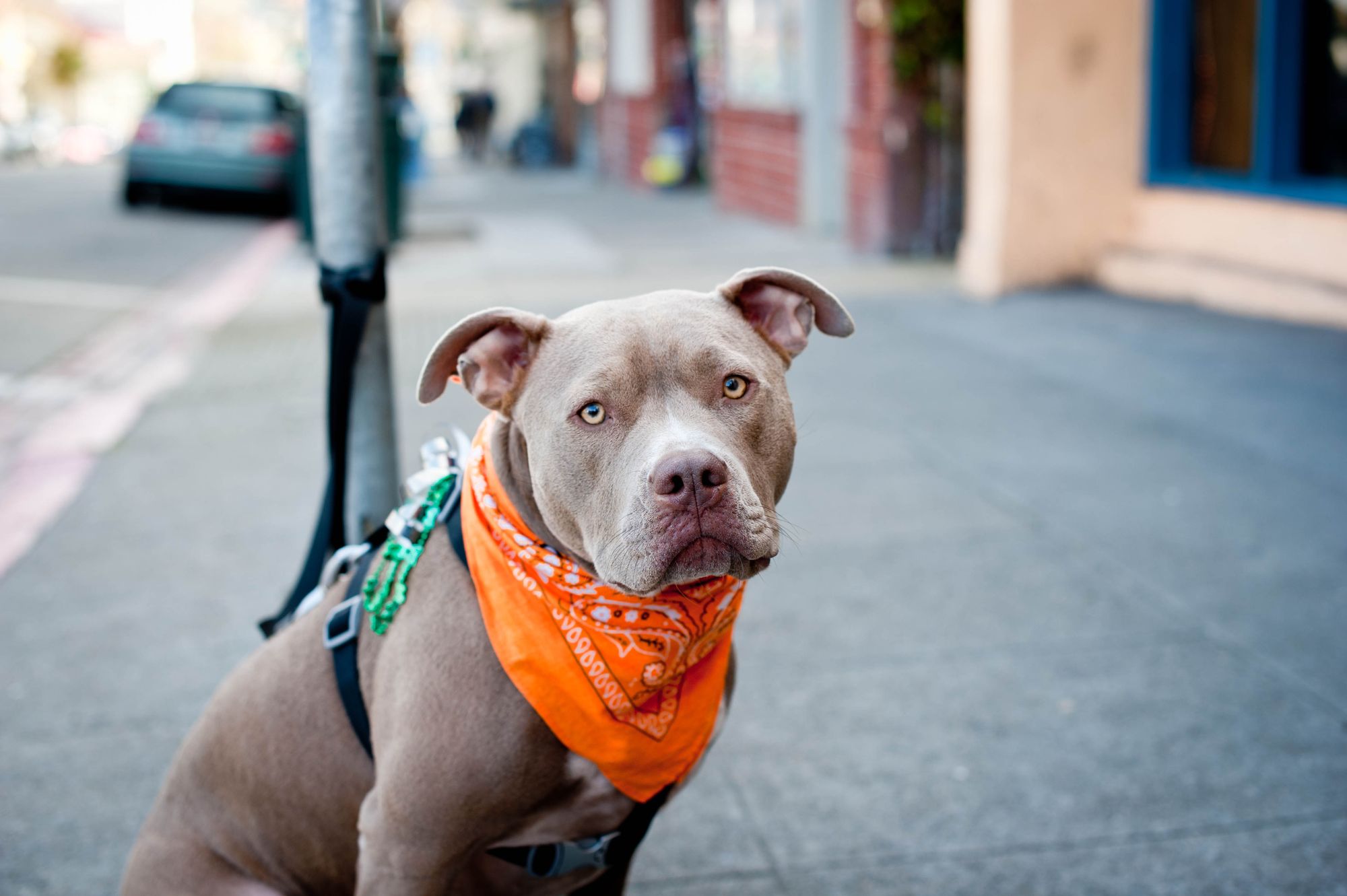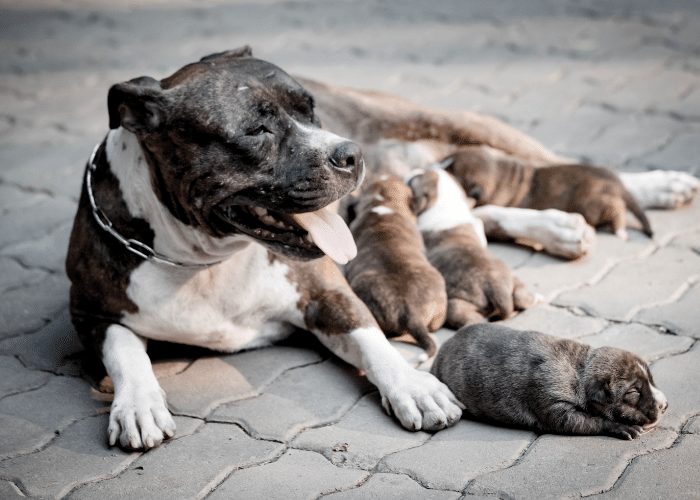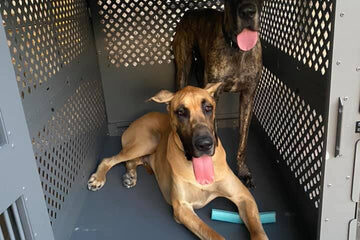A Pitbull can have between 1 to 10 puppies in a litter, with an average of 5 to 7 puppies. The litter size may vary.
Pitbulls are known to have litters ranging from one to ten puppies, with the average litter size being five to seven puppies. Factors such as the health of the mother, inbreeding, and the age of the father can influence the litter size.
Proper care and nutrition during pregnancy and after birth are essential to ensure the well-being of both the mother and her puppies. Understanding the potential litter size of Pitbulls can help future breeders prepare adequately for the arrival of new puppies.
Factors Affecting Pitbull Litter Size
The litter size of a Pitbull can vary, but on average, they can have between five to seven puppies. Factors such as the health and age of the parents, proper care and nutrition during pregnancy, can affect the number of puppies in a litter.
Average Litter Size
The average litter size for Pitbulls typically ranges from five to seven puppies. Proper care before and after birth plays a crucial role in ensuring the well-being of both the mother and her litter.
Breed Characteristics
Pitbull breed characteristics can influence litter size. Factors such as genetics and breeding standards can impact the number of puppies a Pitbull gives birth to.
Health Of The Mother
The health of the mother dog is a vital factor in determining litter size. Ensuring the mother receives proper nutrition and veterinary care can positively impact the size and health of the litter.
Genetic Factors
Genetics play a significant role in determining the litter size of Pitbulls. Inherited traits and genetic predispositions can influence the number of puppies a Pitbull can have in a litter.

Credit: blog.tryfi.com
Understanding Pitbull Pregnancy
Pitbull pregnancies can produce 5 to 7 puppies on average, but litter size can vary. Proper care and nutrition are essential during pregnancy and after birth to ensure the health of both the mother and her litter.
Duration Of Pregnancy
Pitbull pregnancy typically lasts for approximately 63 days, although the precise duration can vary from 58-68 days. It’s important for owners to keep track of the conception date to anticipate the birthing period accurately.
Number Of Litters
The number of litters a Pitbull can have largely depends on various factors such as the age, health, and breeding practices. They can typically have around 1-3 litters annually, with an average litter size ranging between 5 to 7 puppies.
Pregnancy Care
Proper care and nutrition during pregnancy are crucial to ensure the health and well-being of both the mother and her litter. It’s essential to provide a balanced diet, regular exercise, and a stress-free environment for the expecting Pitbull.
How Many Puppies Can A Pitbull Have?
Pitbulls are known for their strong maternal instincts, and when it comes to how many puppies they can have, there are several factors to consider.
Factors Influencing Litter Size
The litter size of a Pitbull can be influenced by various factors including the health of the mom, inbreeding, and the age of the dad.
Typical Litter Size
The average litter size for Pitbulls ranges between five to seven puppies, but individual cases can vary.
First Litter Expectations
During her first litter, a Pitbull may have fewer puppies compared to subsequent litters as she matures and gains more breeding experience.
Subsequent Litters
As a female Pitbull matures, she may be able to produce larger litters, but it’s essential to monitor her health and ensure proper care during each pregnancy.

Credit: blog.tryfi.com
Care And Nutrition For Pitbull Mothers
Proper care and nutrition are essential for pitbull mothers during and after pregnancy. The well-being of the mother and her puppies depends on the care and attention provided, starting from the pregnancy period to post-birth care.
During Pregnancy
Pregnancy in pitbulls lasts approximately 63 days. During this time, the mother requires extra care and attention. Providing a comfortable and stress-free environment is crucial for the well-being of the pregnant pitbull. Regular visits to the veterinarian for check-ups are vital to monitor the mother’s health and the development of the puppies. Adequate exercise and proper nutrition are essential during this period to ensure the mother maintains a healthy weight and stays active.
Post-birth Care
After giving birth, the mother pitbull should be provided with a quiet and warm space where she can nurse and bond with her puppies. It’s important to monitor the mother’s health and behavior closely to ensure she is recovering well from the birthing process. Regular check-ups with the veterinarian are critical to address any post-birth complications and to ensure the health of both the mother and her puppies.
Diet And Exercise
The diet of a pregnant and nursing pitbull is of utmost importance. It should consist of high-quality, nutritious food to support the increased energy demands during pregnancy and lactation. Providing a balanced diet rich in essential nutrients is essential for the health of the mother and the proper development of her puppies. Additionally, moderate exercise is beneficial for pregnant and nursing pitbulls to maintain their physical and mental well-being. It’s important to consult with a veterinarian to create an appropriate exercise routine suitable for the mother’s health condition.
Pitbull Breeding Considerations
Pitbull breeding considerations should include the average litter size of five to seven puppies. Providing proper care and nutrition is essential for the health of both the mother and her puppies. Breeding frequency should be limited to ensure the well-being of the pet.
Pitbull breeding is a process that should be approached with careful consideration and knowledge. Several factors play a crucial role in the breeding process, affecting the litter size, health, and well-being of the dogs involved. It’s essential to understand the frequency of breeding, inbreeding risks, and the age of mating dogs to ensure responsible and ethical breeding practices.
Frequency Of Breeding
The frequency of breeding plays a significant role in the health and well-being of the pitbull. Overbreeding can lead to physical and emotional strain on the female dog, affecting her overall health and the health of the puppies. It’s recommended to allow the female pitbull to have an appropriate recovery period between litters to ensure her well-being.
Inbreeding Risks
Inbreeding in pitbulls can lead to a higher risk of genetic disorders and health issues in the offspring. It’s essential to ensure that the mating of pitbulls does not involve close relatives to minimize the risks of genetic health issues. Responsible breeders carefully consider the genetic background of the dogs and avoid inbreeding to promote the health of the puppies.
Age Of Mating Dogs
The age of the mating dogs is another crucial consideration in pitbull breeding. Female pitbulls should reach physical and sexual maturity before breeding to ensure a healthy pregnancy and successful delivery. Similarly, male pitbulls should also be of an appropriate age to mate, ensuring their ability to contribute to healthy offspring.

Credit: nestpets.com
Common Pitbull Health Concerns
Pitbulls can have varying litter sizes, but on average, a pitbull can have between five to seven puppies in a litter. Proper care and nutrition are crucial to ensure the health and well-being of both the mother and her litter.
Regular veterinary checkups and monitoring during pregnancy and after birth are also important to address any potential health concerns.
Reproductive Health
Pitbulls, like any other breed, can face reproductive health concerns. It is important to monitor the health of the mother during pregnancy and provide proper care and nutrition. Regular check-ups with a veterinarian can help identify any potential issues and ensure the well-being of both the mother and the puppies.
Puppy Mortality
Pitbulls can experience varying rates of puppy mortality. It is essential to understand the factors that can contribute to the survival rates of the puppies. These factors include the health of the mother, the breeding practices, and the care provided after birth. By ensuring a safe and nurturing environment for the puppies, you can reduce the risk of puppy mortality.
Hereditary Disorders
Pitbulls are susceptible to certain hereditary disorders that can affect their overall health. Some common hereditary disorders in Pitbulls include hip dysplasia, heart defects, and skin conditions. Regular health screenings and genetic testing can help identify these disorders early on and allow for appropriate treatment or management.
Overall, it is important to be aware of the potential health concerns that can affect Pitbulls. By understanding and addressing these issues, you can provide your Pitbull with the best possible care and ensure their overall well-being.
Best Practices For Pitbull Owners
As a responsible pitbull owner, it is important to follow best practices to ensure the well-being and happiness of your beloved pet. From consulting a veterinarian to practicing ethical breeding practices, there are several aspects to consider. In this section, we will discuss these best practices and provide you with valuable insights to help you become the best pitbull owner you can be.
Consulting A Veterinarian
Regular veterinary check-ups are crucial in maintaining the health of your pitbull. A veterinarian can provide valuable guidance on nutrition, vaccinations, and overall care. It is recommended to schedule annual visits for vaccinations, heartworm prevention, and dental care. Additionally, if you notice any abnormal behavior or changes in your pitbull’s physical appearance, it is important to seek immediate veterinary attention.
Ethical Breeding Practices
When it comes to breeding your pitbull, ethical practices should always be followed. Breeding should only be considered if you have a deep understanding of the breed’s characteristics and health considerations. It is highly recommended to consult with a professional breeder or veterinarian who can provide guidance throughout the process. By ensuring both the male and female pitbulls are in good health and possess desirable traits, you can enhance the chances of producing healthy and well-tempered puppies.
Socialization And Training
Socialization and training are vital aspects of owning a pitbull or any other dog breed. Introduce your pitbull to various environments, people, and animals from an early age. This will help them develop good social skills and prevent any aggressive behavior. Positive reinforcement techniques, such as reward-based training, should be employed to teach basic commands and obedience. Consistency and patience are key in the training process, and it is important to dedicate time to establish a strong bond with your pitbull.
Conclusion & Responsible Ownership
Ensuring The Well-being Of Pitbulls
Proper nutrition and veterinary care are crucial for pitbull health.
Advocating For Ethical Breeding
Responsible breeding practices help maintain the breed’s integrity.
Promoting Responsible Pet Ownership
Owning a pitbull comes with the responsibility of proper training and care.
Pitbulls need love, care, and responsible pet owners to thrive.
Frequently Asked Questions
How Many Puppies Can A Pitbull Have In Her First Litter?
On average, a pitbull can have a litter size ranging from five to seven puppies in her first litter.
How Long Is A Pitbull Pregnant For?
A pitbull is pregnant for about 63 days. Litter size can range from 1 to 10 puppies, with an average of 5 to 7.
How Many Times Can A Female Pitbull Get Pregnant?
A female pitbull can get pregnant every time she comes in season and can potentially have two litters each year. However, it’s advisable to limit breeding to no more than three times. The average litter size is between five to seven puppies.
Proper care and nutrition are crucial.
Can A Pitbull Have 4 Puppies?
Yes, a pitbull can have 4 puppies in a litter.
Conclusion
Overall, the average litter size for a pitbull can range from five to seven puppies. Proper care and nutrition during pregnancy and after birth are crucial to ensure the health and well-being of both the mother and her litter. It is important to consider factors such as the health of the mother, inbreeding, and the age of the father when breeding pitbulls.
By understanding these factors and providing the necessary care, you can help ensure a successful and healthy litter of pitbull puppies.



